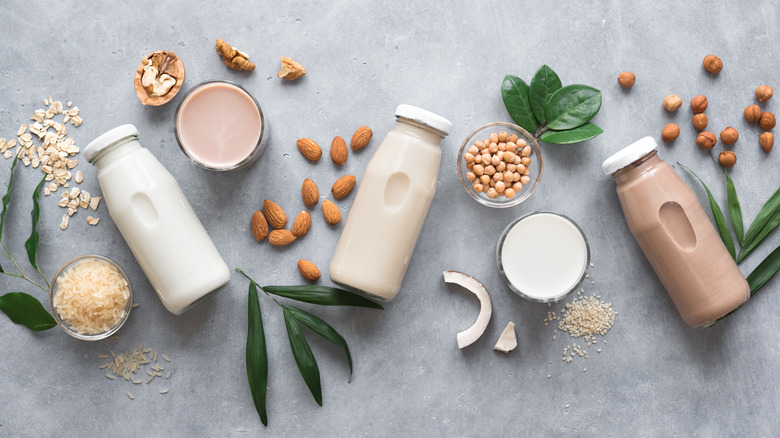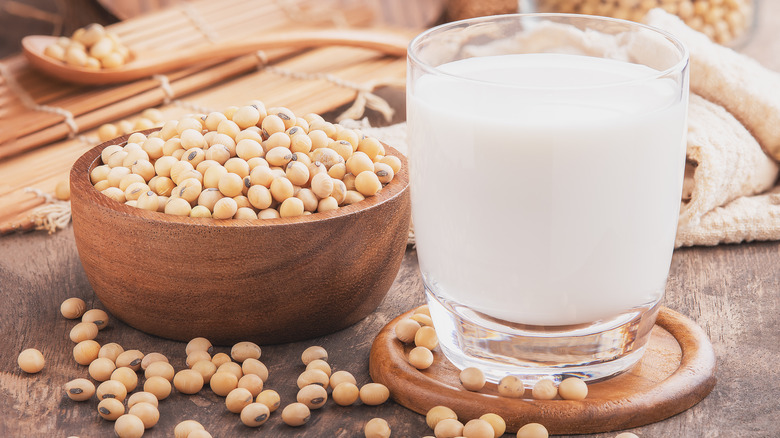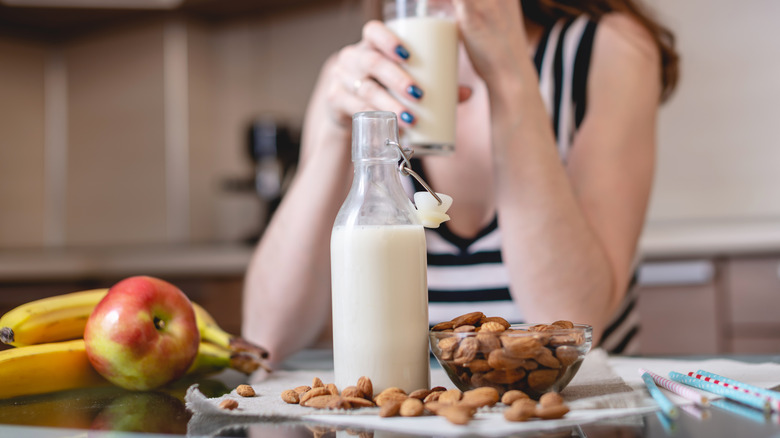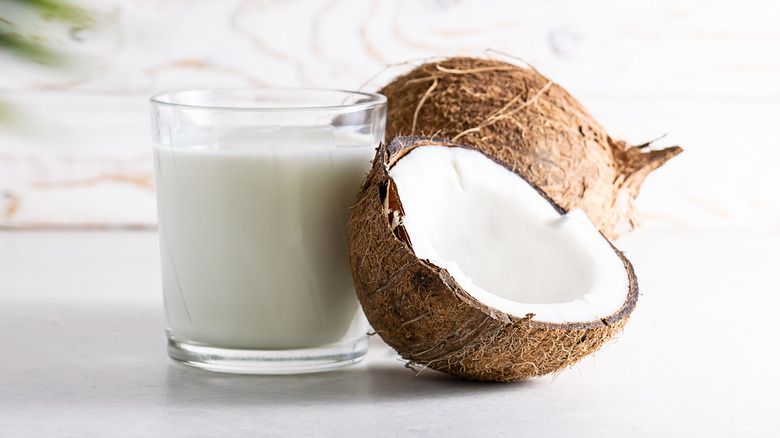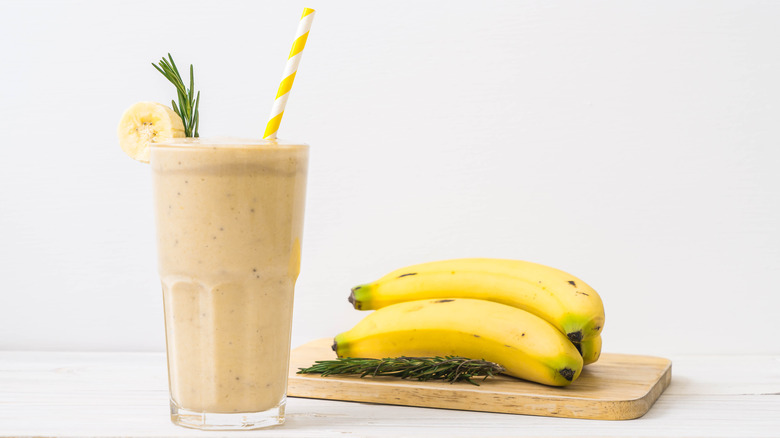Which Milk Substitute Is Right For You?
Looking for milk substitutes that actually taste like milk? First, decide how you plan to use them. Some substitutes are ideal for baking, while others taste better uncooked. For example, Delish recommends using heavy cream, sour cream, yogurt, half-and-half, or evaporated milk in baked goods. Soy, oat, or coconut milk can be a good choice, too — especially for people with lactose intolerance or dairy allergies.
Second, consider your health needs and lifestyle. If you're vegan or someone with lactose intolerance, look for dairy-free milk alternatives. Ideally, choose a product based on rice, soy, pea protein, oats, flaxseeds, hemp, or other plants, suggests Meagan Bridges, a dietician and nutrition support specialist at the University of Virginia Health System. These products are often fortified with vitamins and minerals, which helps increase their nutritional value. But even so, you still need to check the label for added sugar and potentially harmful additives. A good example is carrageenan, a seaweed-derived thickener that may contribute to inflammation and digestive distress. That's something you want to avoid.
Last but not least, think about your diet and health goals. After all, drinking milk every day can affect your body. Some milk substitutes are high in carbs, fat, or added sugar, and the calories can add up quickly. If, say, you're on a ketogenic diet, look for low-carb, high-fat products, such as coconut milk, per Healthline. With that in mind, here's what you should know about the most popular substitutes for dairy milk.
Soy milk, a high-protein option with few calories
Soy milk may not be the tastiest milk substitute, but its nutritional value is hard to match. This beverage has been around forever — its first American reference dates back to 1896, per Soya, but has been consumed internationally for centuries — offering hefty doses of vitamin A, folate, potassium, iron, magnesium, and zinc, according to a 2018 review featured in the Journal of Food Science and Technology. Depending on the brand you buy, it has anywhere between 80 and 120 calories, 3 to 8 grams of carbs, and 7 to 12 grams of protein per serving. Plus, it's low in fat, with just 2.5 to 6 grams per cup. Since it contains no dairy, it's safe for those with lactose intolerance.
With its mild flavor, soy milk goes well in most recipes and can be a healthy addition to protein shakes, smoothies, and raw desserts. The downside is that it contains genistein and other isoflavones, a class of compounds with estrogen-like effects, per a 2016 research paper published in the journal Nutrients. These flavonoids protect against inflammation, cancer, and oxidative stress, but they can also throw your hormones out of balance. In some cases, isoflavones may increase the risk of cancer and suppress immune function. However, further studies are needed to confirm these findings.
To stay on the safe side, enjoy this beverage in moderation. Remember that even the healthiest foods can cause trouble when consumed in excess. Ideally, alternate between soy milk and other beverages to get more nutrients in your diet and keep things varied.
Almond milk, a low-calorie alternative to cow's milk
If you're on a diet, you can't go wrong with almond milk. This beverage has the fewest calories of any plant-based milk, according to 2018 research published in the Journal of Food Science and Technology. One cup provides around 30 to 50 calories, 1 to 5 grams of protein, and up to 3 grams of carbs, depending on the brand. You'll also get large amounts of calcium, vitamin A, vitamin E, folate, potassium, phosphorus, and magnesium. What's more, almond milk may help lower cholesterol levels and aid in weight loss due to its high content of healthy fats.
Calcium, one of the most abundant minerals in this drink, supports bone health and may protect against osteoporosis, per WebMD. Magnesium plays a key role in enzyme production, glycemic control, and energy metabolism. Vitamin E, another essential nutrient in almond milk, keeps your brain sharp until late in life and may reduce heart disease risk. This fat-soluble vitamin can also boost immune function and enhance your body's ability to fight infections, per a 2019 review featured in IUBMB Life.
Unsweetened almond milk is a healthy choice, but some manufacturers may add sugar, which can increase its calorie count. Read the nutrition label and steer clear of any products with hidden sugars, such as dextrose, caramel, brown sugar, molasses, or high-fructose corn syrup. Use this beverage as a milk substitute in baked goods, oatmeal, protein shakes, coffee, and smoothies, or enjoy it as-is.
Coconut milk offers both flavor and nutrition
With its creamy texture, coconut milk can be a wonderful addition to smoothies, frappés, oatmeal, sauces, and soups. Plus, it's an excellent substitute for cow's milk, coffee creamer, and heavy cream. Perhaps unsurprisingly, it delivers more antioxidants than dairy milk, per a 2020 study published in the International Journal of Food Science. As it turns out, coconut milk is rich in polyphenols that scavenge oxidative stress and protect against DNA damage, among other benefits. It also contains lauric acid, myristic acid, caprylic acid, and other fatty acids with health-promoting effects.
This beverage is high in saturated fat, but it doesn't seem to affect blood lipids, according to 2013 research published in the Journal of Nutrition and Metabolism. On the contrary, it may help reduce LDL (the "bad") cholesterol and increase HDL (the "good") cholesterol levels, protecting against heart disease. Moreover, coconut products, including coconut milk, may help lower blood pressure and improve cognition, per a 2015 review featured in the British Journal of Nutrition. Researchers attribute these potential benefits to its high content of healthy fats. Therefore, if you drink coconut milk every day, your body might end up thanking you.
Banana milk, a milk substitute that fights oxidative stress
Banana milk may not be as popular as coconut or soy milk, but this doesn't mean it's less healthy. Depending on the brand, one cup provides about 60 calories, 3 grams of fat, 9 grams of carbs, and 1 gram of protein, plus large doses of calcium, potassium, magnesium, copper, and B vitamins (via Mooala). What makes this beverage stand out is its unique composition.
Unlike other milk substitutes on our list, it contains no soy, nuts, or dairy, and hence is safe for those with food allergies. Some brands go one step further and eliminated sugar, carrageenan, gluten, and genetically modified organisms (GMOs) from their products. Also, note that you can prepare this drink at home by mixing bananas, water, and other basic ingredients like raw honey or cinnamon in a blender.
Loaded with antioxidants, bananas may help reduce oxidative damage and improve overall health, per a 2016 review published in Food Chemistry. On top of that, they can boost your energy levels and enhance sports performance. In a 2012 study, cyclists who ate bananas before and during training performed just as well as those who consumed a beverage rich in carbs, reports the journal PLoS One. As the researchers note, bananas contain both simple and complex carbs, as well as potassium, vitamin B6, and other nutrients needed for an active lifestyle.
Should you use heavy cream, yogurt, or half-and-half as a milk substitute?
As mentioned earlier, heavy cream and other dairy products can replace milk in most recipes. These foods are not necessarily unhealthy, but they often pack more fat and calories than plant-based milk substitutes. For example, light sour cream boasts 136 calories, 10.6 grams of fat, 7 grams of carbs, and 3.5 grams of protein per 3.5 ounces, according to MyFoodData. The same amount of heavy cream has 240 calories, 36 grams of fat, 3 grams of carbs, and 3 grams of protein. Half-and-half cream, by comparison, provides around 131 calories and 11.5 grams of fat per 3.5 ounces. A healthier option is Greek yogurt, which has 100 calories, 5 grams of fat, and 9 grams of protein.
The problem is that dairy products may contain large amounts of saturated fat. That's particularly true for heavy cream, sour cream, cheese, and half-and-half. When consumed in excess, saturated fat can put you at risk for diabetes, heart disease, and cancer, per the Physicians Committee for Responsible Medicine. What's more, the fat and hormones in high-fat dairy foods may affect estrogen levels and contribute to breast cancer in women, per a 2019 study featured in the Journal of the National Cancer Institute.
Remember that moderation is the key to a balanced diet. Choose a milk substitute that supports your health goals and fits your lifestyle. After all, eating too much dairy can affect your body.
